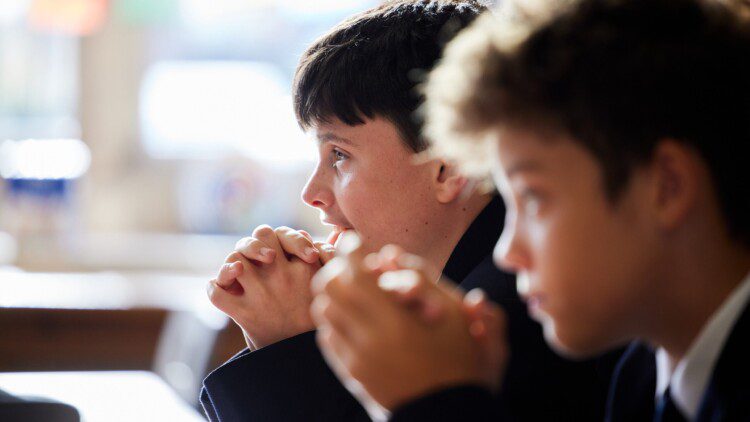Years 7 - 9
Aims/Objectives
RS has an important contribution to make to the spiritual, moral, social, and cultural development of our pupils. By studying the major world religions, pupils can explore what it means to belong to a specific faith group, and what it means to be an adherent of a religion. The philosophical and fundamental questions of human existence can be considered, and how different faiths seek to answer these questions. We look at how the major world religions mark life’s important occasions and events in their histories, and we very much focus on religion in the world today. At all times we attempt to create a balance between ‘learning about’ and ‘learning from’ religions. One of the main objectives of both the school and the department is to give boys the opportunity to consider and explore faiths and philosophies for themselves.
Year 7
Pupils begin by studying creation stories, including those of Genesis, the Hindu Vedas and scientific theories. Then the Nature of God is considered through the Christian Trinity and Hindu Trimurti. Buddhism and Sikhism are also studied to provide an overview of concepts central to ‘Eastern’ Religions. In the summer term the pupils have a day in Cardiff to visiting a Hindu Mandir, Sikh Gurdwara, and a Tibetan Buddhist centre. We have many religious artefacts in the department that help to bring the subject to life. The main focus is understanding the key beliefs and practices in each of the religions, and what it means to be a Christian, Hindu, Sikh, or Buddhist.
Year 8
Pupils study the Torah/Old Testament and the history of Judaism. Modern Jewish practices and beliefs such as Bar Mitzvah and circumcision are considered in conjunction with their origins in the Biblical stories. Jewish festivals practiced today and their origins are an important part of the course. The pupils go on to consider the life, death and resurrection of Jesus as recorded in the New Testament. Several miracles and parables are studied and their relevance to 21st century life is considered. To end the year, the pupils visit four churches/chapels in Monmouth and then produce a project as their summer exam.
Year 9
In Year 9 we consider the whole concept of what it means to believe and how belief affects behaviour/action. We study Islam and look at the origins of the religion and well as what it means to be a Muslim in Britain today. In the Lent term we look at Anti-Semitism; it’s origins, during the 1930s and 40s, and modern-day examples. We spend time reflecting on the Holocaust and we use Anne Frank’s Diary and ‘The Boy in the Striped Pyjamas’ film in our lessons. We also devote time to contemporary moral issues such as environmental issues, animal rights and the death penalty. The boys visit a Synagogue and a Mosque in Cardiff in the Lent term to undertake research for a piece of work on prejudice and discrimination. We end the year by starting the Crime and Punishment GCSE unit to enable the boys who wish to continue with the subject to get ahead.
GCSE/IGCSE
Head of Department: R.L.Wynne Lord
Board: AQA
The Course:
GCSE Religious Studies Specification A
http://www.aqa.org.uk/subjects/religious-studies/gcse/religious-studies-a-8062

The GCSE course is based around the study of Christianity and Buddhism. However, the specification does not presuppose faith and is designed to be accessible to persons of any religious persuasion or none. Rather it gives pupils the opportunity to engage with the religion and consider its role in history and shaping the world we encounter today.
The course as a whole encourages students to acquire knowledge and develop understanding of beliefs, values and tradition and the influence these have on the world around them.
In Year 10, pupils will have the chance to engage with the beliefs and teachings of Christianity and Buddhism. Buddhism is one of the diverse religious traditions and beliefs in Great Britain today and the main religious tradition in Great Britain is Christianity.
In the Christianity section of the course this includes the nature of God, the Trinity, the incarnation of Jesus, the crucifixion, resurrection and ascension, Judgment: heaven and hell, sin and salvation. We also look at Christian practices: worship, prayer, sacraments, pilgrimage, festivals, the role of the church in the local community, the importance of the worldwide church, Christian persecution, the Church’s response to poverty.
In the Buddhism section of the course we study key Buddhist beliefs and teachings including: The Buddha’s life and its significance, the Buddha’s teachings (Dharma), the concept of dependent arising (paticcasamupada), The Three Marks of Existence: anicca (impermanence), anatta (no fixed self) and dukkha (unsatisfactoriness of life, suffering), Theravada and Mahayana traditions. We look at Buddhist practices such as: Worship (puja), festivals and their importance to Buddhists in Great Britain, places of worship including temples, shrines, and monasteries, meditation and visualisation of Buddhas and Bodhisattvas, and Buddhist ethics e.g. (karma) and rebirth.
As part of this course we visit the local Anglican Church at St Mary’s Priory in Monmouth and the Lam Rim Buddhist centre in Raglan.
In Year 11, pupils will be engage with religious, philosophical ethical themes in Christianity and will make some comparisons to Buddhism:
- Theme A – Relationships and families (Marriage, sexuality, gender equality)
- Theme B – Religion and life (The environment, abortion, euthanasia)
- Theme C – The existence of God and revelation (Arguments for God’s existence, the nature of God)
- Theme E – Religion, crime and punishment (Death penalty and corporal punishment, forgiveness)
Assessment:
Candidates sit two papers, both at the end of Year 11:
Component 1: The study of religions: beliefs, teachings and practices Component 2: Thematic studies : religious, philosophical ethical themes
Each paper comprises 50% of the total mark awarded. There is no coursework requirement.
Religious Studies A level
Why study Religious Studies?
Religious Studies is an engaging, well respected and academically rigorous subject which introduces students to a stimulating range of ethical, philosophical and theological issues. The subject fits well as a complement to other arts and humanities subjects, and broadens and deepens the academic profile of those taking science subjects. Throughout the Course, students will engage with some of the great philosophical questions with which humankind has wrestled, as well as examining moral and ethical principles from a variety of standpoints. Through their study of this subject, students will enhance their ability to argue and to communicate, as well as their skills of research, evaluation and analysis.
With religious and ethical issues so often in the news it may not be surprising that the subject is increasingly popular: Research shows that nationally the number of students choosing to study A level Religious Studies has increased more than any arts, humanity or social science subject over the past 10 years. The Russell Group of top universities has also made it clear that Religious Studies A level provides ‘suitable preparation for university generally’. In other words, it can help applicants in both science and humanities subjects.
Religious Studies A level offers excellent opportunities to develop critically informed perspectives on the nature of human experience, perception, belief and society. The skills taught include building arguments, marshalling evidence and examples to support different points of view, and evaluating the strengths and weaknesses of different perspectives. The course content and the skills developed will appeal to anyone interested in big questions about meaning, purpose and reality, and there is a clear focus on lively classroom discussion and debate.
Religious Studies provides excellent preparation for a wide variety of arts, humanities, medical and science degrees, as well as leading on to varied career opportunities in law, medicine, journalism, education, academia, civil service and more. In our increasingly globalised world universities and employers place a high premium on critical and well-informed engagement with the beliefs, values and ethical issues around the world.
If you are interested in life’s big questions, if you enjoy lively discussion and debate, and if you want to examine the impact of religion on culture and society, Religious Studies could certainly be the subject for you.
Head of Department: Mrs R Wynne Lord
Course content
Board: AQA A level Syllabus Code: H573
- Study of Philosophy of Religion and Ethics. Philosophical arguments for the existence of God, evil and suffering, religious experience and language, miracles and belief in life after death. Ethical theories and ethical issues in a contemporary world, such as euthanasia, animal rights, and embryo research/cloning, free will and moral responsibility.
- Study of Christianity and Dialogues (The dialogue between philosophy of religion and religion and ethical studies). Sources of wisdom and authority in Christianity, God and ultimate reality, death and the afterlife, good conduct and moral principles, alongside key issues such as gender, sexuality, science and secularisation. Dialogues – How religion is influenced by, and has an influence on, philosophy of religion and ethics in relation to the issues studied.
Method of assessment
All by written exam (two papers, each of 3 hours) which cover the two topics: Philosophy of religion and ethics, and Study of Christianity and dialogues.
There is no coursework.
Philosophy A level
Why study Philosophy?
Philosophy A level asks students to think for themselves, to think rationally and to be open-minded. Students develop and refine a range of transferable skills, such as the ability to ask penetrating questions, to analyse and evaluate arguments, and to present their own arguments clearly, logically and with precision.
The course content raises stimulating and challenging questions about what we know of reality, and what we can and cannot know of reality. The nature of human consciousness is questioned, and the role of logic, reason and rationality are interrogated. Grounded in such foundational concerns, students then engage with the underlying assumptions found in a range of ethical and philosophical questions about the nature and purpose of human life.
Philosophy is a highly respected academic subject, and at A level standard it sets apart those who are passionate about clear thinking on profound issues. Universities and employers across the spectrum value the critical independence of mind shown by those who study philosophy, and it forms a core part of the famous PPE degree taken by many leading politicians and businesspeople.
Philosophy is currently taught at Monmouth School for Girls.
Head of Department: Mrs R Wynne Lord
Course content
Board: AQA Specification Code: 7172
- Epistemology: the study of what knowledge is. Issues covered include questions about the existence of the world outside of the human mind, the nature of knowledge itself, and what we can really ever actually ‘know’ of what our senses tell us.
- Moral Philosophy: Engaging critically with ethical theories such as those of Aristotle’s Virtue Ethics, Kant’s Dutybased approach, and Utilitarianism. Issues covered include telling lies, simulated killing in computer games and eating animals.
- Metaphysics of God: Introduction to issues around religious language and arguments for and against the existence of God. Issues covered include ways of ‘proving’ the existence of God, paradoxes such as whether an all-powerful God could create a stone which was too heavy for he/she to pick up, and the role of logic in the use of language.
- Metaphysics of Mind: Alternative views of the mind-body problem, and how they relate to each other. Perspectives covered include dualism, materialism and behaviourism, as well as the issue of philosophical zombies and the uses of theoretical argument.
Method of assessment
Two three hour written exams:
- Paper 1 Epistemology and Moral Philosophy.
- Paper 2 Metaphysics and God and Metaphysics of Mind.
The papers contain a combination of 3 mark, 5 mark and 12 marks questions which assess knowledge and understanding, and a 25 mark essay which assesses critical reasoning and evaluative skills in developing arguments.
*Religious Studies or Philosophy?
Religious Studies A level and Philosophy A level do share some content areas, and we would not advise opting for both. Instead we recommend pursuing a qualification in one or other of the subjects. They take distinctively different approaches: Religious Studies emphasises an understanding and appreciation of religious thought and its contribution to the individual, communities and society. Philosophy, however, emphasises the ways in which philosophers have identified underlying ideas about the validity of arguments and their premises.
 Quality RS occurs when we relate the beliefs, concepts and values of the world faiths expressed through such things as their scriptures, worship, practices to shared human experience.
Quality RS occurs when we relate the beliefs, concepts and values of the world faiths expressed through such things as their scriptures, worship, practices to shared human experience.







